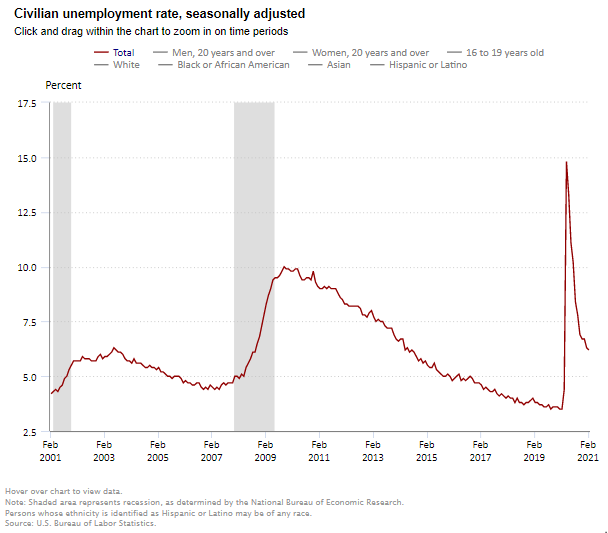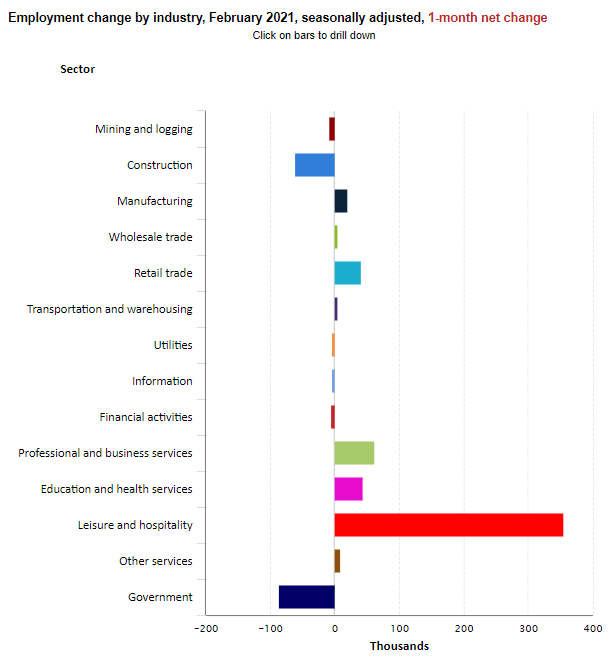The Labor Department reported that nonfarm payrolls rose by 379,000 in February and that the unemployment rate edged lower to 6.2% from 6.3% in January. The jobless rate remains 2.7 percentage points above the pre-pandemic level of 3.5% seen in February 2020, but well below the 14.7% peak seen in April. Despite the February increase, job levels are 9.5 million below the pre-pandemic levels of February 2020 (6.2%), with 3.5 million of that gap in the leisure and hospitality sectors. The consensus estimates for February had been for a gain of 200,000.
Private service-producing jobs increased by 513,000, led by a rise of 355,000 jobs in leisure and hospitality payrolls as pandemic-related restrictions began to be relaxed and restaurant re-openings occurred. Health care added 20,000 jobs in January; this followed a loss of 85,000 in January. Nursing care facilities lost 12,000 jobs in February.

The number of long-term unemployed (those jobless for 27 weeks or more) was little changed from January at 4.1 million but is 3.0 million higher than year-earlier levels, suggesting that this continues to be a very challenging time for many Americans. Long-term unemployed persons account for 41.5% of the total number of unemployed persons.
The underemployment rate or the U-6 jobless rate was unchanged at 11.1% in February. This figure includes those who have quit looking for a job because they are discouraged about their prospects and people working part-time but desiring a full work week.
Average hourly earnings for all employees on private nonfarm payrolls rose by $0.07 in February to $30.01, a gain of 5.3% from a year earlier. These increases largely reflect the disproportionate number of lower paid workers in leisure and hospitality who went off payrolls, which put upward pressure on the average hourly earnings estimates.
The labor force participation rate, which is a measure of the share of working age people who are employed or looking for work was steady at 61.4% in February.
The change in total nonfarm payroll employment for December was revised down by 79,000 from a loss of 227,000 to a loss of 306,000 and the change for January was revised up by 117,000 from 49,000 to 166,000. Combined, 38,000 jobs were added to the original estimates. Monthly revisions result from additional reports received from businesses and government agencies since the last published estimates and from the recalculation of seasonal factors.

The February data is promising and reflects a gradual reopening of parts of the economy and some of the effects of the $600 stimulus checks. The ongoing drop in COVID cases, the widespread distribution of vaccines, and a shift in consumer confidence is needed to allow for a more complete re-opening of the economy and a fuller recovery in jobs. If the $1.9 trillion stimulus package becomes law, further economic activity and additional job growth can be expected in the coming months.
About Beth Mace
Beth Burnham Mace is a special advisor to the National Investment Center for Seniors Housing & Care (NIC) focused exclusively on monitoring and reporting changes in capital markets impacting senior housing and care investments and operations. Mace served as Chief Economist and Director of Research and Analytics during her nine-year tenure on NIC’s leadership team. Before joining the NIC staff in 2014, Mace served on the NIC Board of Directors and chaired its Research Committee. She was also a director at AEW Capital Management and worked in the AEW Research Group for 17 years. Prior to joining AEW, Mace spent 10 years at Standard & Poor’s DRI/McGraw-Hill as director of its Regional Information Service. She also worked as a regional economist at Crocker Bank, and for the National Commission on Air Quality, the Brookings Institution, and Boston Edison. Mace is currently a member of the Institutional Real Estate Americas Editorial Advisory Board. In 2020, Mace was inducted into the McKnight’s Women of Distinction Hall of Honor. In 2014, she was appointed a fellow at the Homer Hoyt Institute and was awarded the title of a “Woman of Influence” in commercial real estate by Real Estate Forum Magazine and Globe Street. Mace earned an undergraduate degree from Mount Holyoke College and a master’s degree from the University of California. She also earned a Certified Business Economist™ designation from the National Association of Business Economists.
Connect with Beth Mace
Read More by Beth Mace